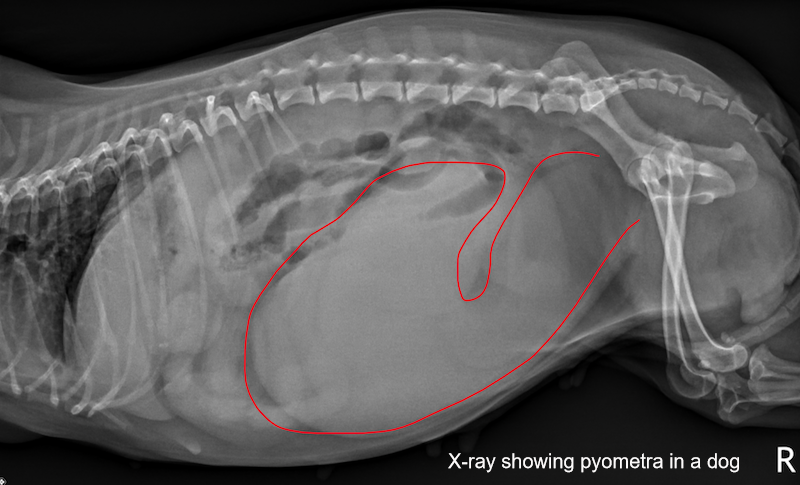Pyometra
Background
Pyometra is a serious bacterial infection of the uterus that occurs most often in older, intact (unspayed) female dogs. The most common bacterium identified in pyometra is E. coli, which typically originates in the feces and ascends through the vagina into the uterus. The infection tends to occur about a month after the dog has been in heat. If unrecognized and untreated, pyometra can lead to a systemic infection or blood poisoning.
Pyometra is often described as being “open” or “closed.” With “open” pyometra, the cervix (the part of the uterus that connects with the vagina) is open, allowing the fluid that forms in the uterus due to the infection to drain out of the body through the vagina.
With “closed” pyometra, where the cervix is closed, the fluid in the uterus cannot drain through the vagina. Instead, it builds up, stretching the uterine walls and potentially causing the the uterus to rupture. If this occurs, the infection may spread throughout the abdomen leading to shock and, potentially, death.
Pyometra is a serious bacterial infection of the uterus that occurs most often in older, intact (unspayed) female dogs. The most common bacterium identified in pyometra is E. coli, which typically originates in the feces and ascends through the vagina into the uterus. The infection tends to occur about a month after the dog has been in heat. If unrecognized and untreated, pyometra can lead to a systemic infection or blood poisoning.
Pyometra is often described as being “open” or “closed.” With “open” pyometra, the cervix (the part of the uterus that connects with the vagina) is open, allowing the fluid that forms in the uterus due to the infection to drain out of the body through the vagina.
With “closed” pyometra, where the cervix is closed, the fluid in the uterus cannot drain through the vagina. Instead, it builds up, stretching the uterine walls and potentially causing the the uterus to rupture. If this occurs, the infection may spread throughout the abdomen leading to shock and, potentially, death.
Risk Factors
The condition is most common in older, unspayed dogs that have never had a litter, but it can occur in any female dog that has not been spayed. About 25% of unspayed dogs will develop pyometra before the age of 10.
Signs
Early in the course of pyometra, there may be no clinical signs. As the infection worsens, signs may include:
Diagnosis
Pyometra is often suspected in any ill, unspayed female who has vaginal discharge and has recently been in heat and is showing the clinical signs listed above. Your veterinarian will likely recommend bloodwork and an abdominal x-ray or ultrasound. If your pet has vaginal discharge, your veterinarian may examine the discharge under a microscope for signs of infection.
Treatment
In most cases, emergency surgery to remove the pet’s uterus is necessary. Pets with pyometra are often dehydrated, feverish, and may have low blood sugar that must be corrected prior to surgery. In preparation for surgery, intravenous fluids, antibiotics, and glucose may be administered. If dogs recover from surgery for pyometra, they are expected to live a normal lifespan.
Prevention
The best way to prevent pyometra is to have your pet spayed. Spaying removes the hormonal stimulation that causes heat cycles, and the uterine changes that allow pyometra to occur.
The condition is most common in older, unspayed dogs that have never had a litter, but it can occur in any female dog that has not been spayed. About 25% of unspayed dogs will develop pyometra before the age of 10.
Signs
Early in the course of pyometra, there may be no clinical signs. As the infection worsens, signs may include:
- Lethargy
- Lack of appetite
- Vomiting
- Diarrhea
- Excessive thirst
- Frequent urination
- White or bloody vaginal discharge
Diagnosis
Pyometra is often suspected in any ill, unspayed female who has vaginal discharge and has recently been in heat and is showing the clinical signs listed above. Your veterinarian will likely recommend bloodwork and an abdominal x-ray or ultrasound. If your pet has vaginal discharge, your veterinarian may examine the discharge under a microscope for signs of infection.
Treatment
In most cases, emergency surgery to remove the pet’s uterus is necessary. Pets with pyometra are often dehydrated, feverish, and may have low blood sugar that must be corrected prior to surgery. In preparation for surgery, intravenous fluids, antibiotics, and glucose may be administered. If dogs recover from surgery for pyometra, they are expected to live a normal lifespan.
Prevention
The best way to prevent pyometra is to have your pet spayed. Spaying removes the hormonal stimulation that causes heat cycles, and the uterine changes that allow pyometra to occur.
~Courtesy of Animal Medical Center NY/pet_health_library
